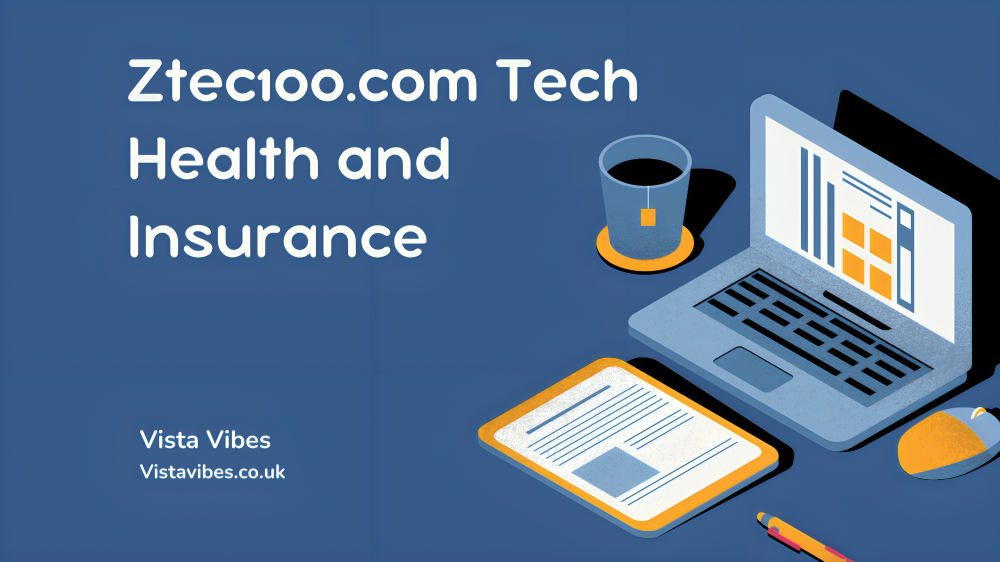Introduction to ztec100.com and its focus on tech, health, and insurance
Welcome to the dynamic intersection of technology, health, and insurance with ztec100.com! In today’s fast-evolving world, these three pillars are crucial for shaping the future of healthcare delivery and ensuring financial security. Let’s dive into how ztec100.com is revolutionizing this landscape by harnessing cutting-edge innovations to empower individuals in navigating the complexities of tech-driven health and insurance solutions.
Importance of technology in the healthcare industry
In today’s rapidly evolving world, technology plays a crucial role in transforming the healthcare industry. From electronic health records to advanced medical devices, innovation has revolutionized how we approach patient care and treatment.
One key aspect of technology in healthcare is its ability to enhance efficiency and accuracy. Digital tools streamline processes, reduce errors, and improve communication among healthcare providers, ultimately leading to better outcomes for patients.
Moreover, technological advancements have paved the way for personalized medicine. Through genetic testing and data analysis, healthcare professionals can tailor treatments to individual needs, maximizing effectiveness while minimizing side effects.
Telemedicine is another groundbreaking development that allows patients to access medical services remotely. This not only improves convenience for individuals but also extends care to underserved communities where traditional healthcare may be limited.
The integration of technology into the healthcare industry continues to drive progress and innovation, shaping a future where quality care is more accessible and effective than ever before.
Impact of technology on improving health outcomes
Technology has revolutionized the healthcare industry, transforming how we diagnose and treat illnesses. With advanced imaging techniques like MRI and CT scans, doctors can pinpoint issues with greater precision, leading to more accurate diagnoses.
Moreover, robotic surgery has enabled surgeons to perform complex procedures with enhanced dexterity and control, resulting in quicker recovery times for patients. The use of electronic health records streamlines patient information sharing among healthcare providers, ensuring seamless coordination of care.
In addition, telemedicine allows patients to consult with physicians remotely, breaking down barriers to access healthcare services. Wearable devices like smartwatches track vital signs and activity levels in real-time, empowering individuals to take proactive steps towards better health outcomes.
Technology continues to play a pivotal role in improving health outcomes by enabling early detection of diseases and facilitating personalized treatment plans for patients.
Role of technology in making insurance more accessible and efficient
Technology plays a crucial role in transforming the insurance industry, making it more accessible and efficient for consumers. With the integration of digital platforms and AI-powered tools, insurance companies can streamline their processes, from underwriting to claims processing. This not only speeds up the overall turnaround time but also enhances accuracy in assessing risks and determining premiums.
Through online portals and mobile apps, policyholders can easily access their insurance information, file claims, and communicate with customer service representatives. This level of convenience empowers individuals to manage their policies on-the-go without the hassle of paperwork or long wait times.
Moreover, data analytics allows insurers to better understand consumer behavior patterns and tailor personalized insurance plans that meet specific needs. By leveraging technology to analyze vast amounts of data quickly and efficiently, insurers can offer more competitive rates based on individual risk profiles.
Technology continues to revolutionize the insurance sector by increasing accessibility for customers while enhancing operational efficiency for providers.
Top tech innovations in health and insurance industries
The intersection of technology, health, and insurance has paved the way for groundbreaking innovations that are revolutionizing these industries. One of the top tech advancements in healthcare is wearable devices. These gadgets allow individuals to track their health data in real-time, providing valuable insights into their well-being.
Telemedicine is another game-changer in the field, enabling remote consultations and treatments through video calls and digital communication. This innovation has enhanced access to medical care for people living in rural areas or those with mobility limitations.
Artificial intelligence (AI) is reshaping both healthcare and insurance sectors by offering personalized solutions based on individual needs and data analysis. AI algorithms can predict health risks, recommend tailored treatment plans, and optimize insurance coverage for better outcomes.
Moreover, blockchain technology ensures secure storage and management of sensitive medical information. By decentralizing data storage, blockchain enhances security measures while streamlining processes like claims processing and medical record sharing.
Wearable devices for tracking health data
The rise of wearable devices has revolutionized how we monitor our health on a day-to-day basis. From smartwatches to fitness trackers, these gadgets provide real-time data about our physical activities, heart rate, sleep patterns, and more. By wearing these devices, we can gain valuable insights into our overall health status and make informed decisions to improve it.
Wearable technology goes beyond just tracking steps; it empowers individuals to take control of their wellness proactively. Whether you’re aiming to increase your daily activity levels or manage chronic conditions like diabetes or hypertension, wearable devices offer personalized feedback and motivation along the way.
Moreover, healthcare providers can leverage the data collected from wearables for more accurate diagnosis and treatment plans. The seamless integration of this technology into the healthcare system opens up new possibilities for remote monitoring and preventive care initiatives.
In essence, wearable devices are not just accessories; they are tools that bridge the gap between personal health awareness and professional medical guidance.
Telemedicine for remote consultations and treatments
Telemedicine has revolutionized the way healthcare is delivered, allowing patients to consult with medical professionals remotely through video calls or messaging. This technology bridges the gap between patients and doctors, especially for those in rural or underserved areas who may struggle to access traditional healthcare services easily.
With telemedicine, individuals can seek medical advice from the comfort of their homes, saving time and reducing the need for physical appointments. Patients can receive timely consultations for non-emergency issues without having to wait weeks for an appointment.
Furthermore, telemedicine enables specialists to provide their expertise beyond geographical boundaries, offering consultation and even treatment options globally. This innovative approach not only enhances patient convenience but also improves overall healthcare accessibility and efficiency.
By leveraging telemedicine tools, Ztec100.com healthcare providers can deliver quality care remotely while maintaining a personalized touch in consultations. This blend of technology and human interaction paves the way for a more connected and efficient healthcare system that prioritizes patient well-being above all else.
Artificial intelligence for personalized healthcare and insurance plans
Artificial intelligence (AI) is revolutionizing the healthcare and insurance industries by providing personalized solutions tailored to individual needs. Through AI algorithms, companies can analyze vast amounts of data to create customized healthcare plans that address specific medical conditions or insurance packages that cater to unique risk profiles.
By leveraging machine learning capabilities, AI can predict health outcomes based on individual behaviors and genetic predispositions. This proactive approach allows for early intervention and prevention strategies, ultimately leading to improved overall well-being.
In the realm of insurance, AI-powered systems can assess claims faster and more accurately, reducing fraud and streamlining processes for both providers and policyholders. Ztec100.com These advancements not only enhance efficiency but also ensure fair pricing based on personalized risk assessment models.
The integration of artificial intelligence into healthcare and insurance is paving the way for a more responsive system that meets the diverse needs of consumers in a rapidly evolving digital landscape.
Blockchain for secure storage and management of medical
As we navigate the complex world of tech, health, and insurance, it’s clear that innovations like blockchain are revolutionizing how we store and manage medical data. With ztec100.com leading the way in integrating technology into these industries, the future looks promising for improved health outcomes and more accessible insurance solutions. Embracing these advancements is key to staying ahead in a rapidly evolving landscape where technology plays a vital role in shaping our well-being and financial security. Explore the possibilities with Ztec100.com today and experience the transformative power of tech in healthcare and insurance.










